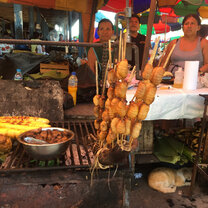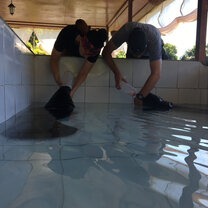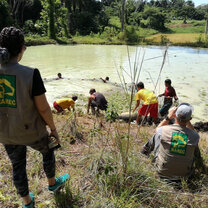I volunteered at RAREC for a month. I was supposed to stay three.
Let me start by saying, almost none of the staff members there are happy. I think 1 or 2 are, and the rest are not. Most everyone leaves early.
Unprofessionalism:
-The directors will talk about firing a staff member to a different staff member, instead of addressing the issue with the member they are having an issue with. They have done this in front of numerous other workers while the worker they were talking about wasn't present.
-The communication with John and Katthya is terrible. For some reason while I was working there, Katthya would almost never communicate things to me that were important, she would instead communicate them to another staff member to then relay it to me. This caused some frustrating issues.
-General followthrough is really lacking in most areas at RAREC. This made doing my job difficult at times. You cannot trust that anything will get done that they say they will do (and you will hear this comment as a warning from many staff members).
Unsanitary conditions:
-Up until just before I left, our dinner would be cooked at lunchtime (11am/12pm) and left sitting on the counter in a warm room until we ate between 6 and 6:30. Chicken, beef, rice, etc, all left out unrefrigerated.
-While I was there, everyone got super sick (fever, throwing up, diarrhea, extreme fatigue, sleeping all day) and not once did anyone go to the doctor to get checked out. There was something at RAREC making all the staff/volunteers sick and John suggested it's because we were just adjusting to the environment. That is impossible, because a lot of those people had already been there for months, and people were dropping like flies one after the other. One person who was sick went home and was positive for e coli. AKA poop in the water. We asked them to sample the water and they lied and said they took the water sample but they actually never did. They promised to have it by a certain date, and over 10 days later, still no results. When me and the volunteer coordinator asked about it (separately) we were ignored until I followed up again.
-A rat lives in the kitchen
-The water they use to wash vegetables to be cooked or used in salads comes from the sink which comes from the lake (where our sewage drains directly into) which I was told by the director John is not treated with chemicals. In his words, the lake has thousands of gallons of water in it and tons of rainwater, essentially diluting it and making it safe.
-We also wash our hands, bodies, and plates with this water.
The animals:
-A lot of the animals are in cages that are too small for them. RAREC puts so much money into the monkeys that are likely to never be released. They don't put enough money into the animals that have a much higher chance of being released.
-I heard from the vets that they often didn't have enough food for the animals by the end of the week.
-The monkeys have been fed dog food, which I was told by vets is not good for them
-There is often not enough enrichment at all in the cages. The animal team needed rope to hang up leaves for the animals and had asked for it more than a month before getting it. This was after I brought it up and John laughed and said they don't need rope to hang leaves. Are they supposed to put them on the floor then? Shortly after this meeting he did go out and buy some rope and the staff/volunteers were finally able to hang up the enrichment.
-The animals' medicine is kept in a fridge in a place where the backup generator doesn't reach. The electricity goes out a lot and sometimes for a whole day. I was told by the vets that this medicine is no longer useful at all (according to peer review studies) after it's been unrefrigerated for a long time. This is a huge issue.
Other:
-They are not transparent with their expenses. They will not share their budget AND actual expenses with everyone. Everyone wonders where all the money goes. Some people are paying thousands of American dollars to be there and yet it took months to get simple locks for the monkey cages so they wouldn't escape.
-The director's family have a VERY nice living space on site, while ours is awful. We wonder if they pay to live there?
-If you are a long term staff member, you will have the worst of the living accommodations. Mold is on your mattress and it will grow on your backpack, clothes, etc. The short term volunteers get the much nicer rooms. Not a big deal, but still makes you scratch your head.










Response from
We are grateful for any feedback regarding experiences at RAREC.
In this specific case, we would like to clarify that the individual in question applied for a long-term assistant internship position, specifically for the Education for Communities role. This position is different from the typical short-term volunteer experience, the participants in these positions do not pay for their stay, as food and basic accommodations are provided in exchange for a 3-month commitment and they are considered Staff.
We have a comprehensive document that clearly outlines the conditions of the accommodations for staff and induction about the rules, which include: do not hang wet clothes in your rooms because that creates mold. Directors have lived in RAREC since its creation 14 years ago, they have worked hard to develop and improve their personal living space near the operations of RAREC. However, everyone is subject to the same environmental challenges, such as mold or insects, if they do not follow the rules related to cleanliness and proper room care.
We take the health and safety of our staff and volunteers very seriously, we make periodically samples of water, and the water passes through a chemical treatment, that process is explained in our Welcome tour, people can even see the pumps and treatment reservoirs, we want to believe that this comment is just a misunderstanding and lack of experience of a water treatment process. RAREC serves approximately 30 people daily, plus 60 animals, and if the water were contaminated, it would affect everyone.
Regarding animal care, we are committed to providing the best possible care within the constraints of being a rescue center. We hold all necessary permits from Peruvian authorities and follow approved protocols about enclosure measurements, enrichment, nutrition, and veterinary care. We also desire to have huge enclosures for every animal, but due to limited resources, it can be challenging to meet this expectation. Our expenses are clear and accessible to anyone as we give monthly presentations about Operational Expenses to staff and volunteers.
At RAREC, we have a volunteer coordinator available to assist volunteers and staff. As the administrator of all operations, Kathya is not always available to handle every individual request personally. There were instances during this specific stay where non-urgent requests, such as picking up things from the city or even parents’ requests for buying cakes and personal hygiene products, were made to Kathya. These questions had to be directed to the volunteer coordinator, which is why we needed to clarify and set appropriate boundaries to ensure that Kathya could focus on her core responsibilities.
We genuinely appreciate all feedback, both positive and constructive. We are committed to continually improving the experience for all future volunteers and staff. We hope that anyone interested in learning more will consider both sides of the situation and take the time to read this response.
Thank you for your understanding and continued support. RAREC Team.